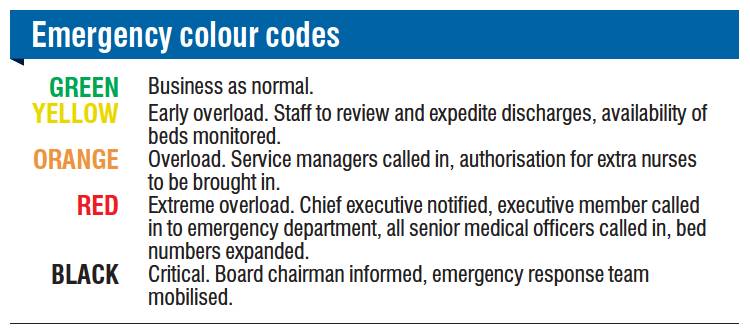
On Wednesday, the Southern District Health Board took the unprecedented step of issuing a "code black" alert as Dunedin Hospital reached bursting point.
The public was asked to go to their GP or after-hours medical services, while medical staff worked frantically to clear the backlog of patients in the Emergency Department.
Several patients, or their relatives, contacted the Otago Daily Times yesterday to highlight how long they were forced to wait.
One patient with dementia was obliged to wait 22 hours to be seen, while another with a heart issue complaint was stranded in corridor for 24 hours.
"I have never complained about anything in my life but I think on this occasion I might fill the complaint form in ... it’s ridiculous."
Nurses were "run off their feet" and continually apologised for the situation patients had found themselves in, another person mentioned.
The plight of the hospital eased considerably yesterday and was assessed as "code yellow", the earliest stage of patient overload.
SDHB chief medical officer Nigel Millar said while the situation was much improved, there were several patients still awaiting surgery.
At 10am yesterday only one patient was waiting to be seen at ED.
"There has been great work done by clinical staff and management and support teams and we had it really under control by mid to late afternoon," he said.
"We were able to support a lot of people to get home, which meant we could move people out of the ED ... we were stretched, the nurses in particular were under a great deal of pressure, but they did a great job."
The SDHB’s colour code system is part if its "escalation plan", a policy to monitor patient flow through the hospital, still being developed.
Dr Millar said it became apparent on Tuesday a major problem was looming in Dunedin Hospital and the plan had to be hurriedly put into action.
"We had been refining our plan but we thought we had better start using it first thing.
"We’ll keep using it now and further develop it as we go."
Anniversary weekend had been a factor behind fewer patients behind discharged during the holiday period than expected, Dr Millar said.
That lesson had been taken on board and would influence planning for the upcoming Easter and Anzac Day holidays.
A leading medical practitioner said the issue was not unique to Dunedin, and without support would only get worse.
Australasian College for Emergency Medicine president Dr John Bonning said emergency departments were where the stress was most visible, but the whole health structure was under rising pressure.
Dr Bonning was meeting Health Minister Andrew Little today to call for more support for the system.







!["They [mayors] do not have the capacity, capability or desire to do the job" — Otago regional...](https://www.odt.co.nz/sites/default/files/styles/odt_landscape_small_related_stories/public/story/2026/01/c-memorialhall-1.jpg?itok=4Go2bdgg)



